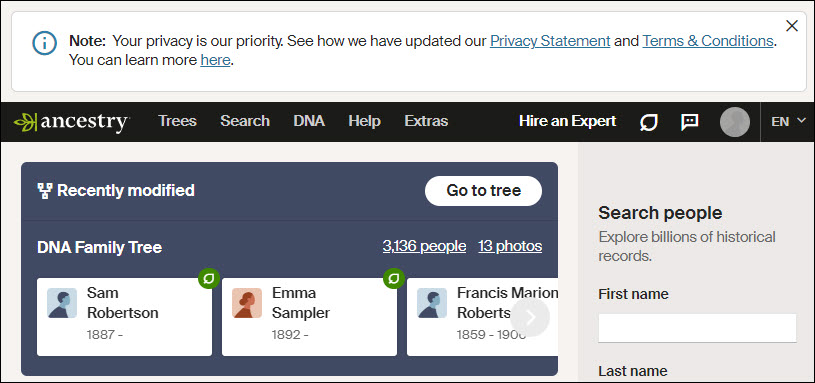Lastly, much less law-geek-speak…
So it’s August, which suggests Ancestry could be anticipated to return out with its annual updates to its privateness coverage and phrases of service.
Which is why it was no shock when the e-mail landed in The Authorized Genealogist‘s inbox: “We’ve up to date our Phrases and Privateness Assertion.”

Phrases of service (or phrases of use), bear in mind, are the boundaries someone who owns one thing we wish to use (like a web site) places on whether or not or not he’ll allow us to use it. This isn’t copyright regulation; it’s contract regulation — we and whoever owns the factor we wish to use attain a deal: a web site lets us entry the location and its data and we agree to make use of it solely within the methods the web site says we will. Wikipedia says phrases of use, phrases of service and phrases and situations are all the identical factor (they’re) and defines the phrase as “the authorized agreements between a service supplier and an individual who desires to make use of that service. The individual should conform to abide by the phrases of service with a purpose to use the provided service.”
That’s a very good definition, and, on this case, the phrases of use govern whether or not we will use the Ancestry web site and, if we do, what rights we’re giving Ancestry.
Now you bear in mind the kerfuffle final 12 months, when Ancestry up to date its phrases to claim a perpetual and non-revocable license to user-contributed content material. Below the regulation, that meant a person couldn’t change his or her thoughts about any content material uploaded to the service: as of the efficient date of that change, the person had gifted the rights to make use of that content material to Ancestry, perpetually.
After pushback by customers — together with this one — Ancestry retreated and stated it actually didn’t imply it: “However the non-revocable and perpetual nature of this license, it terminates when your Person Supplied Content material is deleted from our programs.”
Effectively, lastly, it appears just like the authorized crew at Ancestry has gotten it proper. They’ve dumped the law-geek-speak terminology, gone with as near plain English as we’re prone to get, and made issues as clear as we’re prone to see:
Ancestry doesn’t declare any possession rights to Your Content material, management the way you select to share Your Content material inside the Companies, or restrict the way you share Your Content material outdoors of Ancestry’s Companies.
By submitting Your Content material, you grant Ancestry a non-exclusive, sub-licensable, worldwide, royalty-free license to host, retailer, index, copy, publish, distribute, present entry to, create spinoff works of, and in any other case use Your Content material to supply, promote, or enhance the Companies, constant together with your privateness and sharing settings. You’ll be able to terminate Ancestry’s license by deleting Your Content material, besides to the extent you shared Your Content material with others they usually have used Your Content material. You additionally agree that Ancestry owns any indexes that embody Your Content material and will use them after Your Content material is deleted.
So the perpetual and non-revocable license language is gone, hopefully for good. Briefly: stuff you add is yours. You need to use it elsewhere if you wish to. You’ll be able to take away it from Ancestry in case you determine you wish to. But when it’s been uploaded publicly (equivalent to hooked up to a public tree), and different customers have used it, Ancestry isn’t going to wash their accounts. And if information you’ve contributed has been added to an index, it stays within the index even in case you’ve deleted the contributed supply doc.
So… what else did Ancestry change in addition to this?
Not a lot we actually have to be involved about. It modified its previous language about needing a mother or father’s or guardian’s consent to make use of Ancestry “(i)f you might be between the ages of 13 and 18” to replicate the truth that the age of consent could also be completely different in differing jurisdictions. It now says you want consent in case you are “between the ages of 13 and the age of consent the place you reside.”
It’s expanded its clarification of its dispute decision system for Individuals (we will sue in small claims courtroom or go to binding arbitration, and no class actions), however with none change within the primary construction of the system.
It added a piece that claims it “doesn’t settle for, evaluate, or think about unsolicited concepts or supplies (together with, with out limitation, new promoting campaigns, new promotions, new merchandise or applied sciences, processes, supplies, advertising and marketing plans, or new product names)” and if anyone does ship alongside an unsolicited thought, it’s truthful sport.
It added required language about privateness rights of customers in jurisdictions with particular privateness legal guidelines, equivalent to California, Colorado, Connecticut, Virginia and Australia.
And that’s just about it this time round.
Cite/hyperlink to this submit: Judy G. Russell, “Getting it proper,” The Authorized Genealogist (https://www.legalgenealogist.com/weblog : posted 16 Aug 2022).
SOURCES

